Building GRIT in the Math Classroom
India White • June 21, 2023
Building GRIT in the Math Classroom

Building Grit In the Math Classroom
Grit is a key factor in success, both in math and in life. It is the ability to persevere through challenges and setbacks. As a math teacher, you can help your students develop grit each day. As you help students understand the concept of grit, having a gritty mindset, and how to cultivate grit, they will be able to overcome obstacles faced during instruction, math discourse and math anxiety. Here are some strategies for building grit in math class:
1. Cultivate a Growth Mindset in Students
A growth mindset is the belief that intelligence and abilities can be developed through hard work and dedication. Research has shown that teaching a growth mindset can help students develop grit, aka, “academic tenacity”. When students believe that they can improve their math skills through hard work, they are more likely to stick with it when the going gets tough.
One way to teach a growth mindset is to praise effort, not just achievement. For example, instead of saying "You're so smart," say "I can see how hard you worked on that problem." This helps students understand that effort is what leads to success. Further, allow students to take control of instructional delivery through sharing opinions during real problems. Allow students to lead moments of mathematical discourse, activities for math practice. Further, challenge them with various opportunities during class practice to strengthen student voice. This validates the findings of studies that have shown that students can grow from a fixed mindset to a growth mindset, which helps them to develop a math identity which results in mathematical achievement. A growth mindset is what will continue to help learners bounce back during moments of discouragement during learning and to remain confident that they’ve got what it takes to be successful in math.
2. Provide opportunities for practice
Mathematical practice is essential for developing grit. When your math students have the opportunity to practice their math skills, they are developing the grit they need to persevere through challenges. Provide your students with plenty of opportunities to practice their math skills, both in class and at home. Allow students to express their work through use of whiteboards, manipulatives, and other tools that can help them elaborate on their thinking during conceptual understanding. Further, refer to the standards for mathematical practices
as a roadmap to navigate through various parts that take place during their learning. For instance, as students are attending to precision, be intentional as you scaffold them through the problem. Ask questions to dig through their prior knowledge and keep them aligned to benchmarks discussed during the lesson. As you do this, continue to check for understanding and compliment students as they make strides during their persistence.
Another way teachers can provide opportunities for practicing math is to use online math programs. Research has shown that online math programs can be effective for improving math skills. For example, a study by Rakes et al. (2010) found that students who used an online math program showed significant improvement in math skills compared to a control group. As you make use of math programs, make sure the program is one that provides rigor, speaks to multiple learning styles, and can really build students from procedural fluency to conceptual understanding while providing feedback for growth.
3. Use Real-World Examples and Math Projects
Real-world examples can help your math students see the relevance of math in their lives. When students understand how math is used in the real world, they are more likely to develop the grit they need to persevere through challenges. Use real-world examples to help your students see the value of math and to motivate them to keep trying. As they build upon the relevance, this increases their engagement which impacts their grit levels in a positive way. Studies have shown that grit has had a significant and positive affect on student engagement and academic achievement. With the help of real world problems, students can have a sense of ownership and pride in their work as they prove that they are achieving in their math class.
One way to use real-world examples is to incorporate math into everyday activities. For example, you could have students calculate the cost of groceries or the distance between two cities. This helps students see how math is used in their daily lives. Further, allow students to work on real-world math
projects that require rubrics and assign roles to hold them accountable. This also exposes them to the reasons why they would need to learn particular math concepts in the classroom and how it is relevant for their lives.
4. Encourage Peer-to-Peer Collaboration
Healthy peer-to-peer collaboration can help students develop grit. When students work together, they can support each other through challenges and setbacks. Encourage collaboration in your math class by assigning group projects or having students work in pairs.
One way to encourage collaboration is to use cooperative learning strategies. For example, you could have students work in groups to solve a math problem. This helps students learn from each other and develop teamwork skills. Dr. Linda Kagan provides several collaborative strategies that help students remain organized while working together including round robin, turn and talk and more!
Choose to invest in some of these collaborative strategies as you build a learning environment of adventure and exploration for your students.
5. Provide Moments for Teacher feedback
Feedback is essential for learning and growth. When you provide feedback to your math students, you are helping them develop the grit they need to persevere through challenges. Provide your students with constructive feedback that helps them understand what they are doing well and what they need to improve. In their article on the Power of Feedback, Dr. John Hattie and Dr. Helen Temperley (2007) speak on how teacher feedback helps contribute to student gains and achievement when implemented effectively.
Students need to know that they are making progress, and they are looking to their teacher to give them affirmation and confirmation.
One way to provide feedback is to use formative assessments. Formative assessments are assessments that are used to provide feedback to students during the learning process. For example, you could have students take an exit quiz after each math lesson to see how well they understand the material. Further, having various forms of assessment, i.e., giving an oral assessment, having students create math quiz or test questions, and project-based learning opportunities can help you truly understand where students are in their understanding of their learning.
Conclusion
In conclusion, building grit in math class is essential for your students' success in your math class and in life. By teaching a growth mindset, providing opportunities for practice, using real-world examples, encouraging collaboration, and providing feedback, you can help your math students develop the grit they need to persevere through challenges. It’s never too late to build grit with students. As you implement these five strategies, and follow-up with students with fidelity, they will grow into independent thinkers that you can facilitate through a lesson towards great progress, leading to proficiency. Remind students to use great resilience in time
as they navigate through math with success!
References:
Rakes, G. C., Valentine, J. C., McGatha, M. B., & Ronau, R. N. (2010). Online mathematics homework increases student achievement. Contemporary Educational Psychology, 35(2), 123-130. doi: 10.1016/j.cedpsych.2010.01.005
Hattie, J., & Timperley, H. (2007). The Power of Feedback. Review of Educational Research, 77(1), 81–112. https://doi.org/10.3102/003465430298487
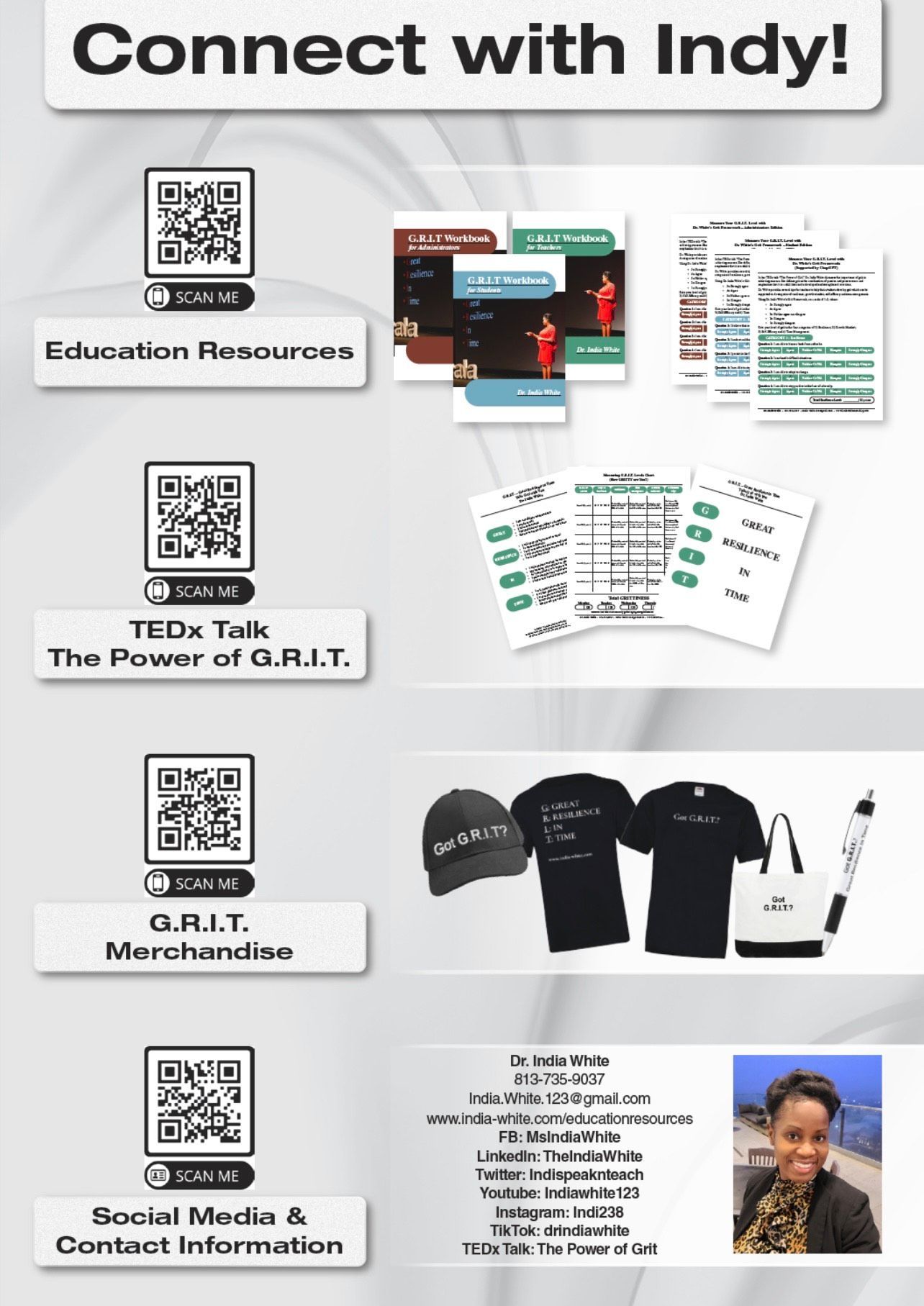

Full-Circle Moment with the Junior League of Sarasota Yesterday, I had the incredible honor of delivering a keynote for the Junior League of Sarasota—an experience that left me both humbled and energized. The atmosphere in the room was electric, filled with leaders, visionaries, and changemakers committed to uplifting our community. It reminded me, once again, that we are truly better together. A Moment Years in the Making What made this keynote especially meaningful was the presence of two pillars in my life: • My high school teacher, Ms. Wilson, whose encouragement helped shape the woman I am today • The family of Representative Detert, whose legacy of service and leadership continues to inspire me To stand on a stage alongside individuals who helped guide my early steps was a powerful full-circle moment. It was a reminder that mentorship is not just influence—it is impact, growth, and generational empowerment. The Power of Community The Junior League of Sarasota brought together a room filled with passion and purpose. As I looked out at the audience, I felt overwhelming gratitude. Every conversation, every smile, and every spark of excitement confirmed that collective impact is alive and well. When we unite with shared intention, real change happens. Gratitude for This Season I am deeply grateful to be alive and present in this season—one where doors are opening, connections are strengthening, and stories are being shared to inspire others. This keynote is an experience I will cherish forever. It reminded me why I do what I do and why it matters. Moving Forward with Purpose As I continue my journey in advocacy, education, and empowerment, I carry this moment with me. I carry the love of my mentors, the support of my community, and the fire that comes from walking boldly in purpose. Here’s to more full-circle moments. Here’s to gratitude. Here’s to being better together. Hashtags: #Gratitude #FullCircle #BetterTogether #Inspiration #DrIndiaWhite #Mentors #Sarasota #SarasotaCounty #ABC7News #Grateful #UF #TEDx
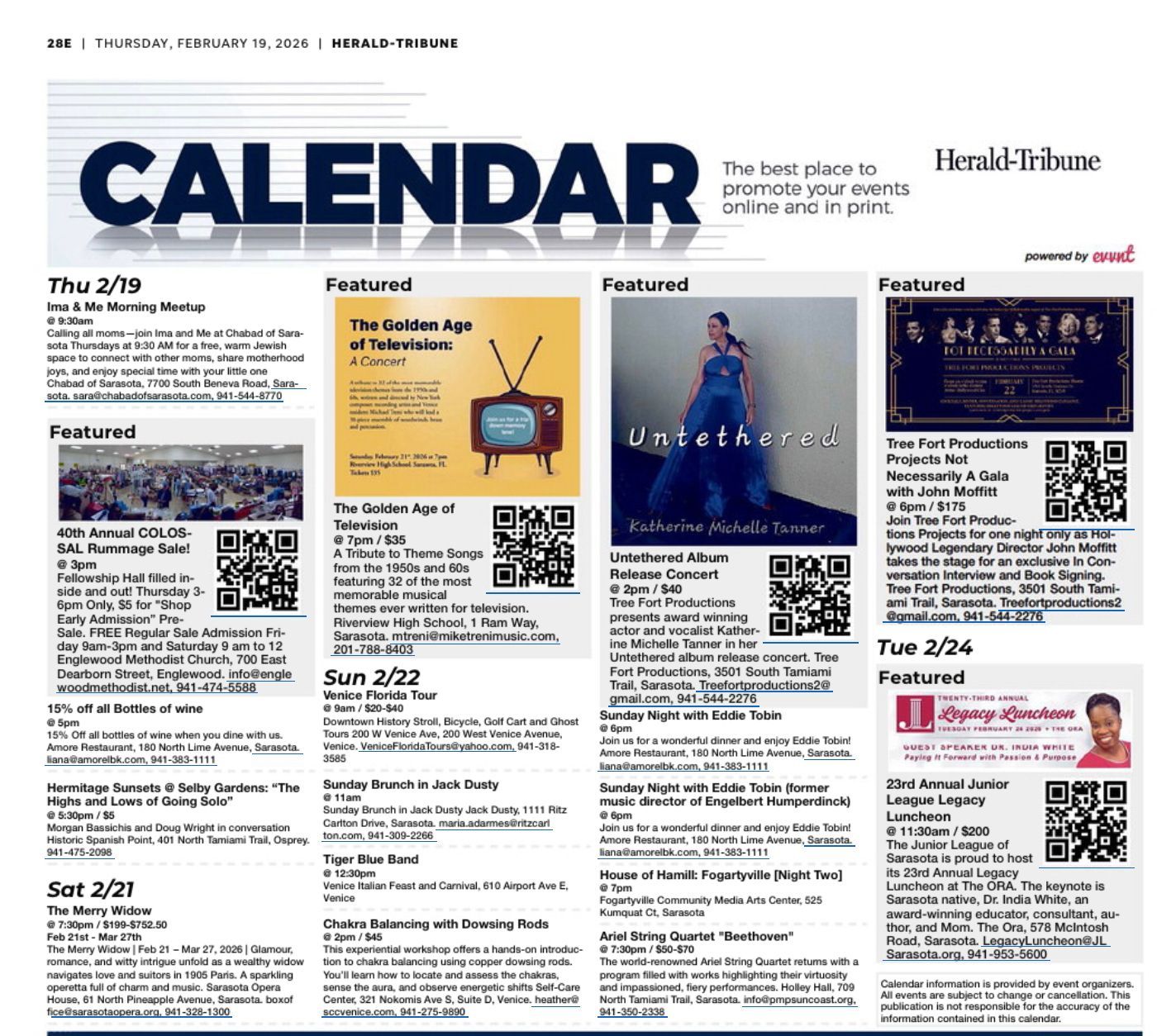
📰✨ We Made the Newspaper!!! ✨📰 What an incredible honor to be featured in the Sarasota Herald-Tribune ! 💛 A heartfelt THANK YOU to the Herald-Tribune for covering this exciting upcoming event. Your support helps amplify moments that truly matter in our community—and this one is special. This is going to be such a powerful time for Sarasota to come together, join hands, and truly pay it forward . 🤝🌟 When a community unites with purpose, there is no limit to what we can accomplish. I am incredibly honored to serve as the keynote speaker 🎤✨ and even more honored to celebrate and uplift the legacy of the late Nancy Detert . 🕊️💙 Her dedication, leadership, and love for this community continue to inspire us all. Her impact wasn’t just political—it was personal. She believed in people. She believed in possibility. And she believed in Sarasota. As we gather at Sarasota High School , we are not just attending an event… We are stepping into a movement. A moment of legacy. A commitment to lifting others as we climb. 💫 This is about grit. This is about service. This is about building something that lasts far beyond a single day. Let’s get GRITTY 💪🏾🔥 Let’s give back ❤️ Let’s build legacy 🏛️ Let’s make GREAT things happen—together! 🚀✨ #DrIndiaWhite #Grit #Sarasota #PayItForward #CommunityStrong #Legacy #LetsGetGritty

Coming Full Circle: Returning to Sarasota with Gratitude and G.R.I.T. I am filled with gratitude and emotion as I prepare to return to Sarasota; not just as a speaker, but as someone whose life was forever changed by the generosity, vision, and grit of this community. Many years ago, I stood on the other side of opportunity as a formerly homeless teen, supported by scholarships made possible by leaders and organizations—many of whom will be in the room when I return. Those investments were not just financial; they were votes of confidence. They said, “We see you. We believe in your future.” And that belief changed everything. To now come back and say thank you; not in words alone, but through purpose-driven work—is truly humbling. Honoring a Legacy of Advocacy and Impact This moment is especially meaningful as we continue the legacy of Rep. Detert, a tireless advocate for students, education, and formerly homeless youth like myself. Her leadership embodied what it means to pair policy with compassion and action with accountability. She didn’t just talk about equity—she fought for it. That legacy lives on in the leaders, educators, and community members who refuse to let circumstance define a child’s future. The G.R.I.T. of This Organization What stands out most about this organization and its leaders is their impeccable G.R.I.T.**—growth mindset, resilience, self-efficacy, and time invested wisely in people. This is not performative work. This is long-haul, legacy-building leadership. You don’t just open doors—you walk alongside young people until they’re strong enough to run through them. A Personal Thank You Returning to Sarasota is deeply personal. It is a reminder that when communities choose to invest in potential, the ripple effects last generations. I am living proof that grit grows when someone believes in you long enough to help you believe in yourself. Thank you for sowing seeds years ago. Thank you for continuing the work. And thank you for allowing me to return—not just to speak, but to honor a legacy that helped shape my life. This is full circle. And we’re just getting started. 💙

Grit Meets AI: Reflections from the Florida Distance Learning Association Conference This past week, I had the absolute pleasure of presenting at the Florida Distance Learning Association Conference, and I’m still energized by the conversations, questions, and passion I witnessed from professors and K–12 educators across the state and beyond. My session focused on G.R.I.T. and Artificial Intelligence in the math space (Grades K–12); and more importantly, how we can responsibly and intentionally use AI to strengthen learning rather than replace good teaching. G.R.I.T. + AI = Powerful Instruction During the session, I shared how my G.R.I.T. framework, Growth Mindset, Resilience, Self-Efficacy, and Time Management, can serve as a guardrail for AI integration in mathematics. AI is not here to do the thinking for* students; it’s here to help students think better. We explored how AI can: * Support productive struggle rather than shortcut it * Differentiate instruction while maintaining high cognitive demand * Build student confidence through feedback and reflection * Help teachers reclaim time without sacrificing rigor From elementary number sense to secondary algebra and beyond, AI—when paired with grit—becomes a powerful ally in equity-centered math instruction. A Call to Professors and Teachers Whether you teach future educators at the university level or students in a K–12 classroom, my encouragement is this: don’t fear AI—frame it. When grounded in pedagogy, purpose, and perseverance, AI can help us close gaps instead of widening them. If you’re preparing teachers, now is the time to model what ethical, effective, and gritty AI use** looks like in practice. Let’s Stay Connected If this message resonates with you, I invite you to continue the work with me: * 📘 Explore my books and G.R.I.T. resources designed for educators and leaders * 🎤 Book me to speak or lead professional learning for your school, district, or conference * 🌐 Visit my website for tools, courses, and upcoming events Together, we can ensure that innovation never outpaces intention—and that grit remains at the heart of learning in every classroom, whether in person or online. Let’s get gritty. Let’s get intentional. And let’s lead the future of math education—wisely and boldly. 💪📊🤖
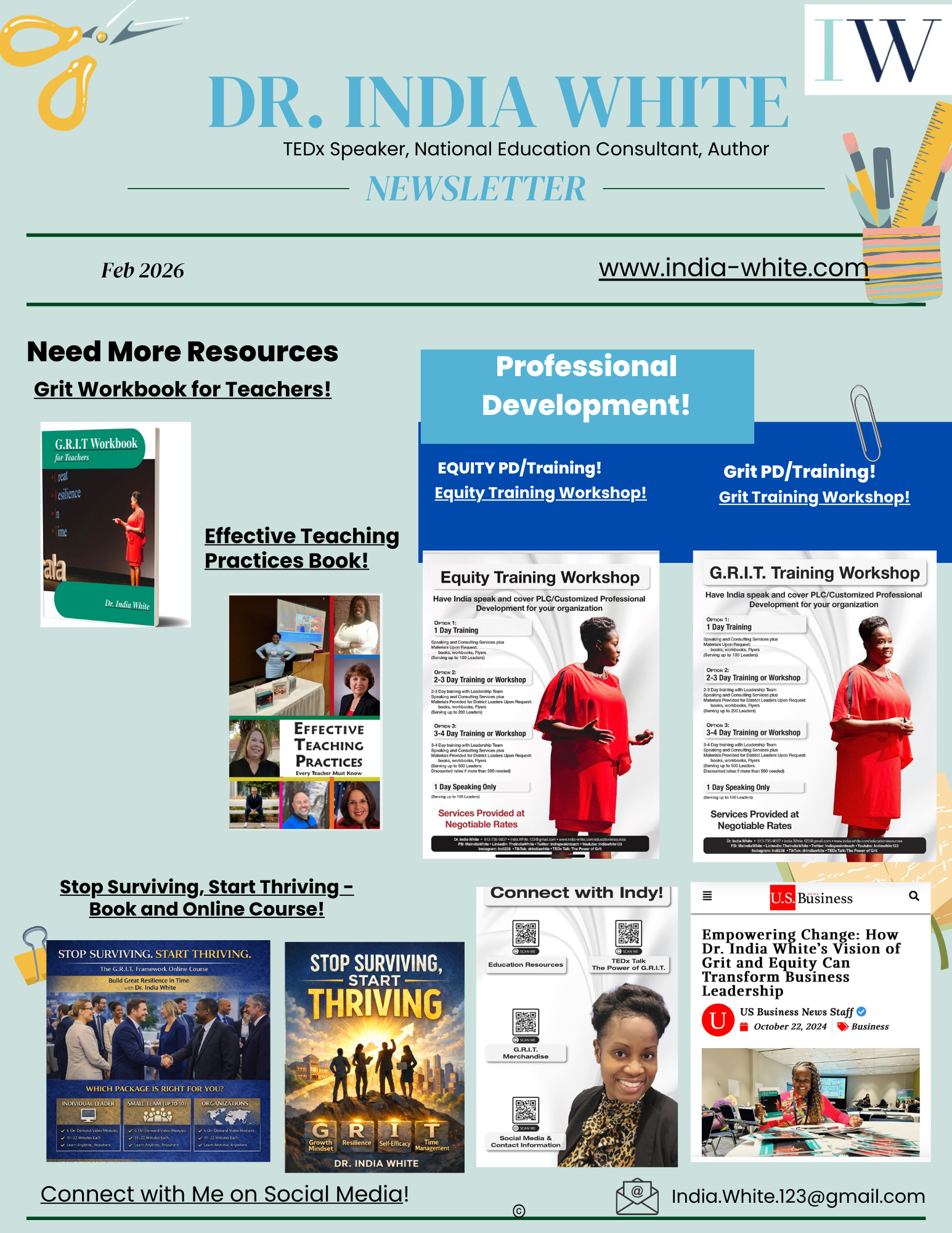
February Energy, Connection, and Celebration—Our Newsletter Is Live! 🎉 I’m so excited to share our February Newsletter, and whew—what a month it has already been! February has been full of learning, laughter, inspiration, and powerful connections, all while we celebrate Black History Month and continue the work of building equity and excellence in education. One of the biggest highlights this month was presenting aUtah Council of Teachers of Mathematics (UCTM)**. Connecting with educators in person in Utah was such a joy. The energy in the rooms, the thoughtful questions, the shared commitment to students—it reminded me why I love this work so much. Teachers showed up curious, gritty, and ready to grow, and I left feeling deeply encouraged. At the same time, I had the opportunity to connect with educators online through Florida Distance Learning Association (FDLA), and let me tell you—virtual spaces can be just as powerful! Engaging with teachers across distances, sharing ideas, and learning together in real time was an absolute blast. Whether in Utah or online, the common thread was clear: educators are hungry for tools that help students thrive. And February isn’t slowing down yet! I’m counting down the days as I prepare to serve as a keynote speaker for the Junior League of Sarasota at the end of the month. I’m truly honored and excited to share space with leaders who are committed to impact, service, and community transformation. This month’s newsletter captures all of that momentum—where I’ve been, what’s coming next, and how we can stay connected. If you haven’t checked it out yet, I invite you to take a look, share it, and reach out. Let’s collaborate, dream big, and keep building together. February is reminding me that connection fuels purpose—and I’m grateful for every educator, leader, and partner walking this journey with me. Let’s keep celebrating, learning, and getting gritty—together. 💛✨

🌟 What an ABSOLUTELY PHENOMENAL time at UCTM presenting on grit games! 🎉 The educators in Utah are truly AMAZING! I feel so blessed to share insights on grit and connect with new friends—cheering each other on to get pumped up again! 💪✨ Had a hilarious time trying to throw hoops with Dan (I only made ONE shot—let’s just say my accuracy needs some work! 😂🏀). It was fantastic to connect with such inspiring friends and leaders in the math community, sharing exciting updates that Savvas has for all the math teachers out there! 📚🔍 BIG shoutout to the UCTM board, Jackie, the Savvas team, and all the incredible Utah educators! Thanks for a blast of a time! 🚀🙌 #GritAndGames #UpliftEducators #MathMagic #ConnectAndInspire #SavvasUpdates #FunInEducation ✨❤️ (I don’t own music copyright)
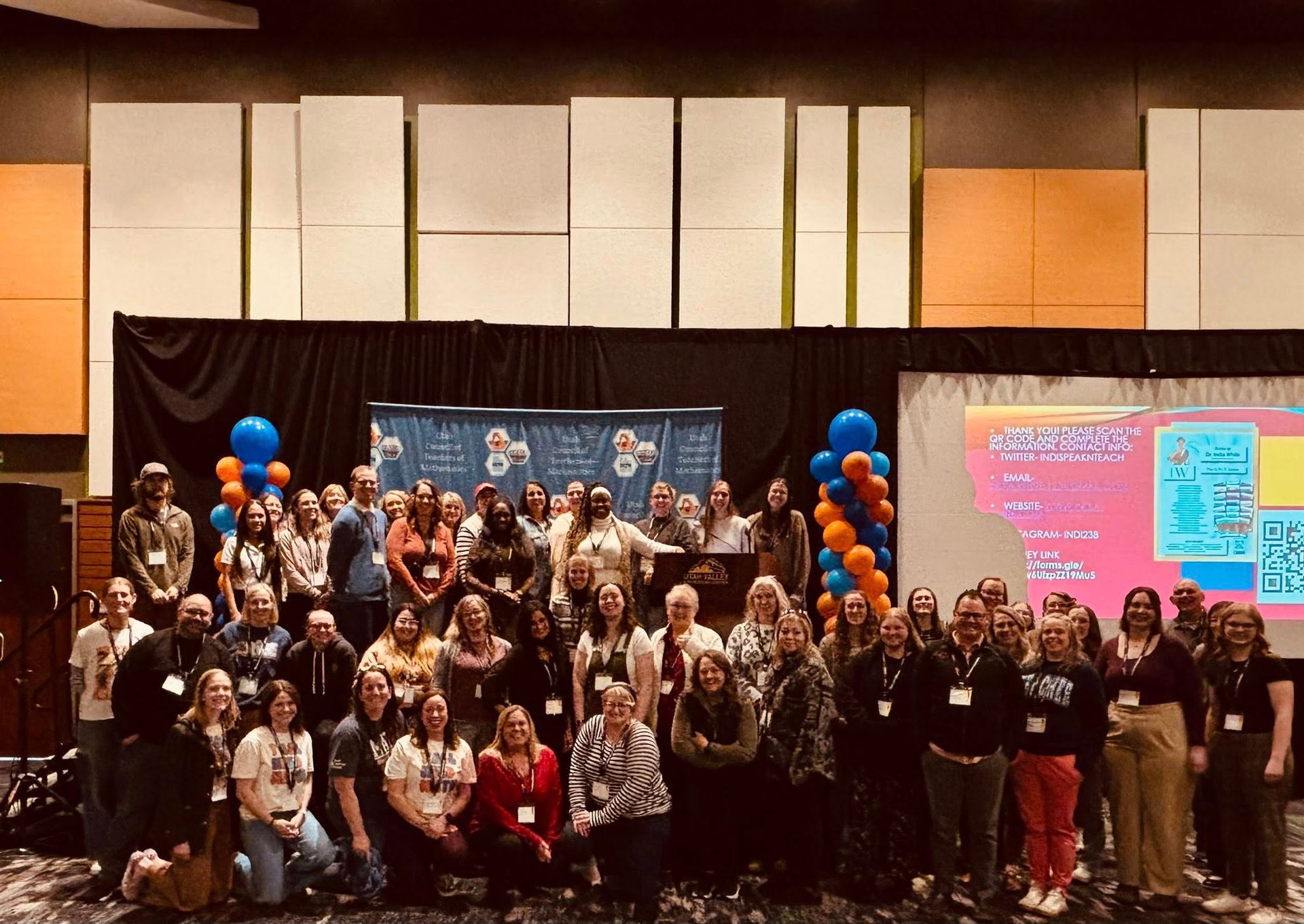
I am incredibly grateful for the opportunity to speak at UCTM 2026. The energy in the rooms was powerful, and several sessions were filled with educators eager to grow, reflect, and strengthen their practice—especially during my session on building gritty thinking in the classroom. Experiences like this remind me why this work matters so deeply. Teachers came ready to engage in meaningful conversations about productive struggle, perseverance, and how to move beyond surface-level engagement into true student thinking. One of the highlights was hearing how excited educators were about the new Savvas math books and the way these resources support conceptual understanding, collaboration, and confidence for learners at all levels. When curriculum, instruction, and mindset align, we truly begin to bridge the gap for students. At the heart of these conversations was the powerful connection between Thinking Classrooms and my G.R.I.T. Framework—Growth Mindset, Resilience, Self-Efficacy, and Time Management. Together, they create learning environments where students don’t just solve problems, they learn how to persist, reflect, and believe in themselves. Building grit starts with a growth mindset. In a thinking classroom, struggle is not a setback—it’s evidence of learning. Teachers can normalize this by celebrating multiple strategies, modeling mistakes, and using language that reframes being “stuck” as part of the thinking process. When students understand that effort and revision are expected, they engage more deeply and take greater ownership of their learning. Resilience grows through collaboration. Thinking classrooms thrive when students work together, share ideas, and wrestle with concepts as a team. Random grouping, structured roles, and intentional math discourse help students learn that perseverance is strengthened in community. When learners support one another, they build confidence and stamina to tackle challenging tasks. Self-efficacy develops when student thinking is valued. Using vertical non-permanent surfaces like whiteboards lowers the fear of making mistakes and encourages risk-taking. Asking students to explain their reasoning and highlighting their ideas—whether complete or still developing—signals that their thinking matters. Over time, students begin to see themselves as capable mathematicians. Time management is another critical component of grit. Teachers can support this by breaking tasks into phases, using visual timers, and guiding students to reflect on how they used their time. These habits help students learn to pace themselves, stay focused, and persist through complex problems—skills that extend far beyond the math classroom. The questions we ask also shape gritty thinking. Instead of rescuing students, we can ask questions that prompt reflection and strategy: What do you already know? What have you tried so far? What could you try next? These questions keep students engaged in the process and strengthen their independence as thinkers. Finally, reflection brings it all together. Ending lessons with opportunities for students to reflect on effort, strategies, and moments of perseverance reinforces that grit is just as important as correctness. When we celebrate persistence as much as achievement, students learn that growth happens over time. UCTM 2026 was a powerful reminder that educators everywhere are committed to creating classrooms where students feel supported, challenged, and empowered. I am grateful for every teacher who showed up ready to learn, collaborate, and push their thinking. Let’s stay gritty, keep learning together, and continue bridging the gap so every learner has the opportunity to thrive.
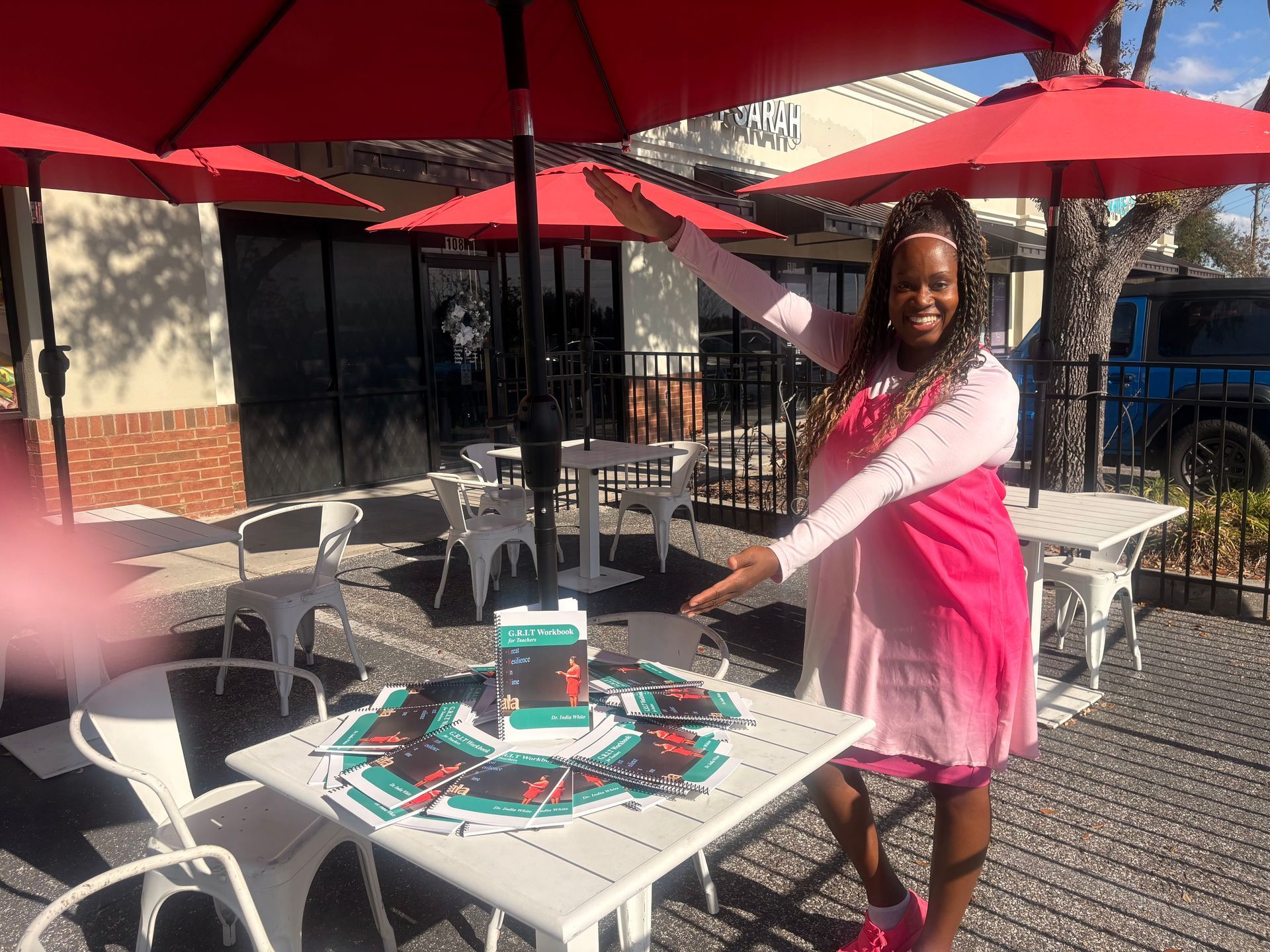
🎉 Exciting news, teachers! 🎓✨ I’m gearing up for an amazing trip to UCTM, and I want YOU to join the fun! Don’t forget to check out my latest video where I reveal some fantastic door prizes that could be yours! 🎁🙌 Let’s connect, learn, and make unforgettable memories together. Click the link and find out how you can win! 🚀💼 👉✨ #UCTM2026 #TeachersRock #drindiawhite #nabse @#foryou (I don’t own copyright to music ) Let’s make this an event to remember! 🙏🎉

It’s Official! The 60-Day Weight Loss & G.R.I.T. Discipline Reset Has Launched 🎉 I’m excited to officially announce the launch of my newest transformational experience—the 60-Day Weight Loss & G.R.I.T. Discipline Reset! This course has been thoughtfully designed for individuals who are ready to stop starting over and finally build the discipline, consistency, and mindset needed to see lasting results. Led by Dr. India White, this 8-week online course goes beyond traditional weight loss programs. It focuses on sustainable change through my proven G.R.I.T. Framework: Growth Mindset, Resilience, Self-Efficacy, and Time Management. This isn’t about extremes or quick fixes—it’s about building habits that fit real life and last well beyond 60 days. What’s Included Participants receive access to: * An introductory video to reset your mindset and set clear expectations * Eight weekly modules that build discipline step by step * A conclusion video to help you transition from a reset to a lifestyle Each week is intentionally structured to help you strengthen both your body and mind, so progress doesn’t disappear once motivation fades. Why This Course Works So many weight loss programs focus only on what to eat or how to exercise—but they ignore the mental discipline required to stay consistent. This course fills that gap. You’ll learn how to: * Stay resilient during setbacks * Manage your time realistically * Build confidence through small, sustainable wins * Create routines that work even on busy days To deepen the experience, I highly encourage participants to pair the course with the 60-Day Weight Loss G.R.I.T. Workbook, available on Amazon. The workbook provides daily reflections, habit tracking, and accountability tools that align with each week of the course. Who This Course Is For This course is perfect for: * Individuals ready to lose weight with structure and purpose * Busy professionals, educators, leaders, and entrepreneurs * Fitness trainers and wellness professionals * Anyone seeking discipline, clarity, and long-term results Enroll Today If you’ve been waiting for the right time to recommit to your health, this is it. The 60-Day Weight Loss & G.R.I.T. Discipline Reset course is now live and ready for you. 👉 Click the link to purchase and enroll today 👉 Start your 60-day reset 👉 Build discipline that lasts a lifetime Your healthiest, most disciplined self is within reach—and G.R.I.T. is the bridge to get you there.
